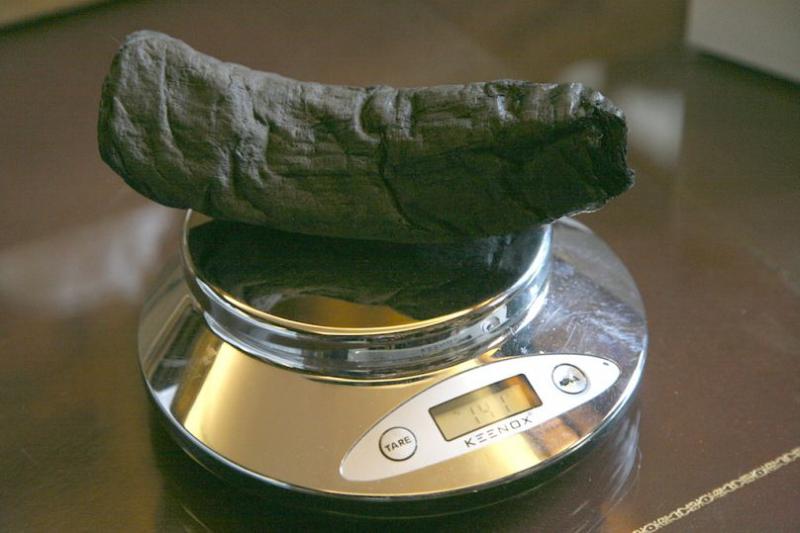AI helps decode scrolls destroyed during the Vesuvius eruption
Through Artificial Intelligence (AI), a team of researchers have decoded the text of an Ancient Greek scroll burnt in the Pompeii eruptions nearly two millennia ago.
In decoding the document, the team have won a contest called the Vesuvius Challenge, named after the volcano that erupted and destroyed the cities of Pompeii and Herculaneum in AD 79. During the cataclysmic eruption, a library of papyrus scrolls was buried.
- ‘More than just the Trevi Fountain’: Historian to the stars Alexander Mariotti’s guide to Rome
- Archaeologists discover extraordinary 2000-year-old Roman flatpack bed in central London
This library is known as the Herculaneum Papyri and was discovered in 1752 by a farmer. At first, most of the charred scrolls were thought to just be charcoal. It was only when someone noticed the faint trace of letters that the breadth of historical knowledge trapped under carbonised papyrus was recognised.
Although early attempts to decipher some of the delicate scrolls resulted in their destruction, hundreds of other scrolls have been housed in museums around the world. Last year, following advances in x-ray technology that allowed scientists to read the unopened Dead Sea scrolls, a challenge was set to try and do the same for the Herculaneum Papyri.
The charred scroll read by the winnersVesuvius ChallengeThe Vesuvius Challenge was set up by Nat Friedman, Daniel Gross, and computer scientist Brent Seales with a prize fund of over $1 million (€930,000) and a top prize of $850,000 (€790,000) to go to anyone who could successfully decoding 5% of one of the scrolls of the papyri.
Created in 2023, the challenge closed at midnight on 1 January 2024. After running through the many submissions, the winners of the coveted prize have been announced.
Youssef Nader, Luke Farritor, and Julian Schilliger were the winners of the huge top prize. All three were already known to the competition. The 21-year-old Farritor is a SpaceX intern from Nebraska and had already won $40,000 (€37,000) from the challenge for successfully decoding the first full word of the scrolls when he found the word “ΠΟΡΦΥΡΑϹ” (purple).
Similarly, Nader is an Egyptian PhD student in Berlin who read a few columns of text a few weeks after Farritor. Nader won the second place prize for that challenge, but the clarity of his version over Farritor placed him as the leader for the supergroup he formed with the Nebraskan.
Finally, finishing off the supergroup is Schilliger, a Swiss robotics student in Zurich who has won prizes for his 3D maps of the papyrus.
Youssef Nader, Luke Farritor, Julian SchilligerVesuvius ChallengeTogether, this dream team of techno-archaeologists created a 3D model of the architecture of the scrolls and designed an AI-based ink detection code to generate a digital rendering of the text. All the code created has been made publicly available on GitHub by the team.
Thanks to their work, 5% of the first scroll has now been deciphered, a challenge seemingly impossible to the farmer who discovered the treasures 272 years ago.
According to the Vesuvius Challenge, the content of the scrolls is a never-before-seen text from antiquity. Scholars are hard at work to fully understand the meaning of what the team discovered, but initial readings believe it may be the musings on pleasure of Epicurean scholar Philodemus, who is believed to be the philosopher-in-residence where the scrolls were found.
The text decoded by the teamVesuvius ChallengeThe end of the scroll remarks on the value of things in abundance over the value that comes from scarcity: “as too in the case of food, we do not right away believe things that are scarce to be absolutely more pleasant than those which are abundant.”
“Is the author Epicurus' follower, the philosopher and poet Philodemus, the teacher of Vergil? It seems very likely,” Richard Janko, Gerald F. Else Distinguished University Professor of Classical Studies at the University of Michigan writes. “Is he writing about the effect of music on the hearer, and comparing it to other pleasures like those of food and drink? Quite probably.”
On the blog-post about the text, the Vesuvius Challenge posits these writings may even Philodemus writing the equivalent of a “blog post” on Epicurean philosophy and throwing a dig at the counter school of Stoicism.
Excitingly, more info will likely be on the way. The Vesuvius Challenge has set a new target for its 2024 challenge. Now, winners of the prize are expected to decode at least 90% of all four scrolls.
منبع خبر: یورو نیوز ![]()
اخبار مرتبط: AI helps decode scrolls destroyed during the Vesuvius eruption
حق کپی © ۲۰۰۱-۲۰۲۴ - Sarkhat.com - درباره سرخط - آرشیو اخبار - جدول لیگ برتر ایران

